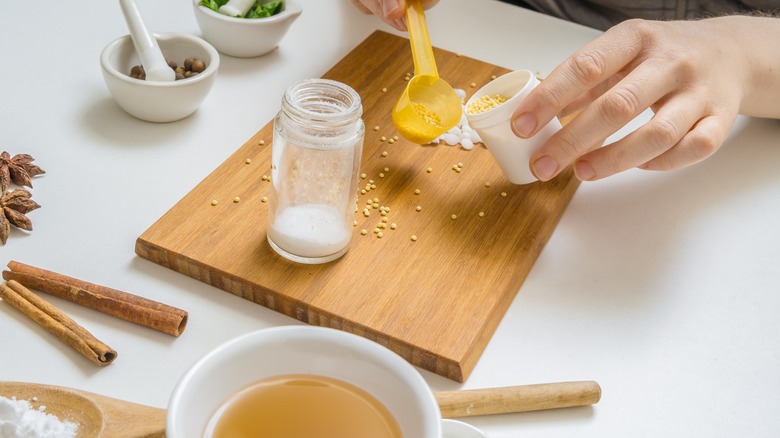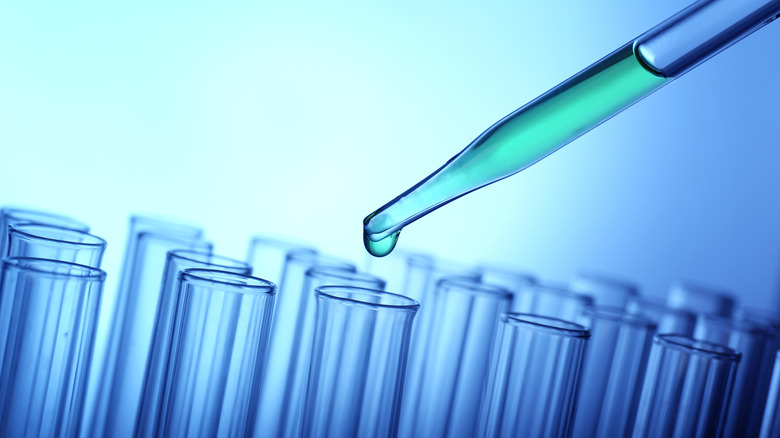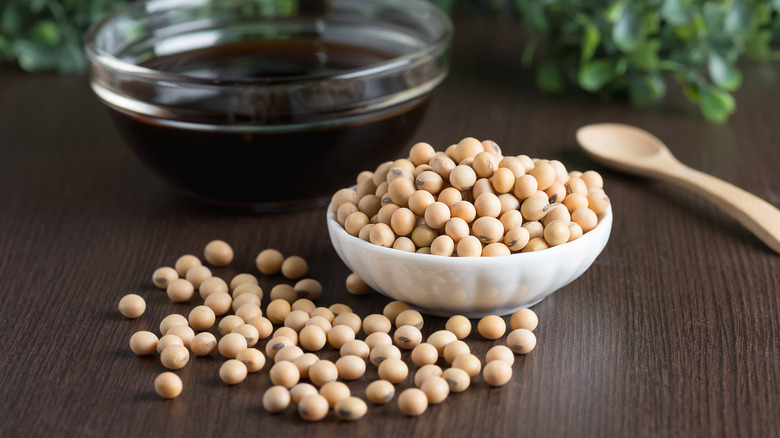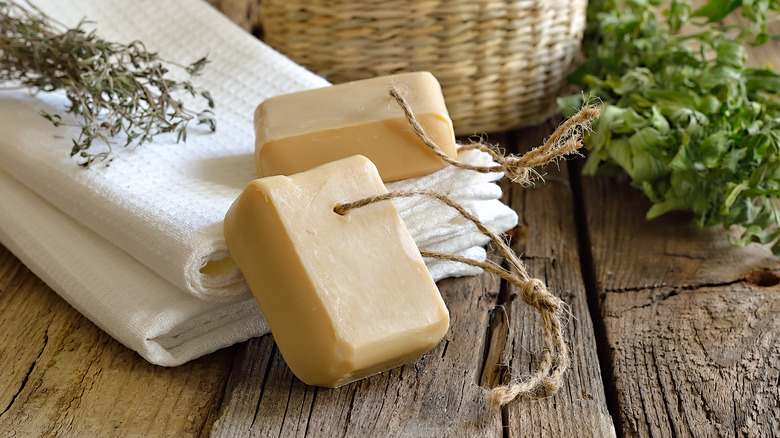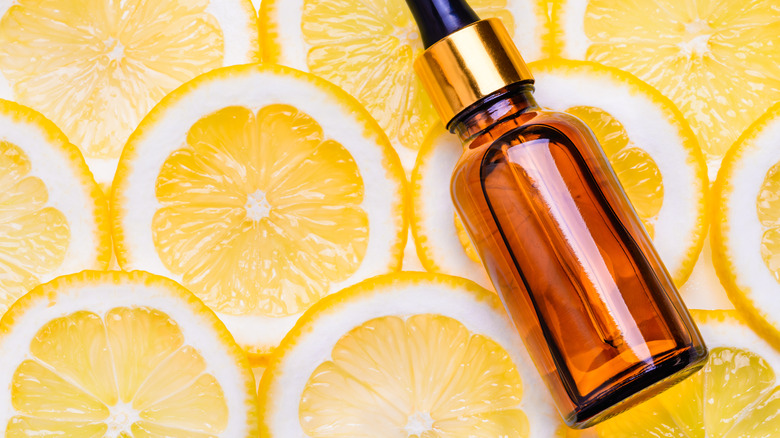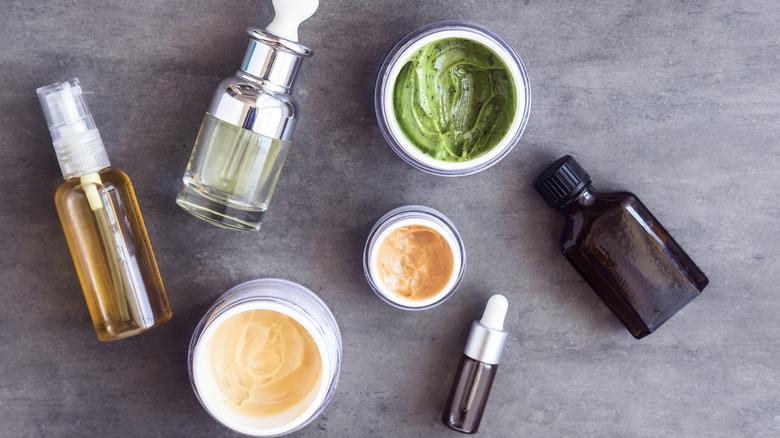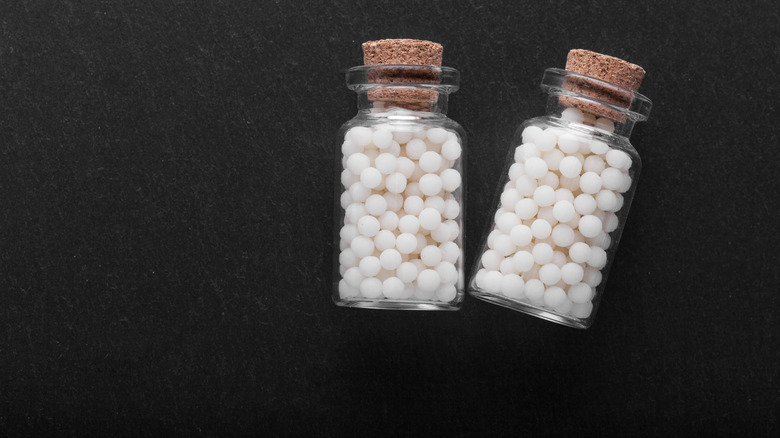The Untold Truth Of Natural Products
Buying natural beauty products is more than just a craze — it's part of an overall healthy lifestyle. We all know that natural is a popular buzzword, but what does "natural" really mean? You would think it would accurately describe a product with no artificial ingredients, perhaps is chemical-free, or made from things found growing in the ground. But, that is not necessarily true. You will never look at natural products the same way again when you learn their untold truth.
It turns out that many natural products are not natural at all. In fact, many can contain dangerous chemicals that at the very least can irritate your skin and at the very worst can cause life changing long-term illnesses. Just don't forget to grab a garbage bag because you might clean out your medicine cabinet in a major way after learning these shocking facts.
The definition of natural depends on what country you live in
In America, the Food and Drug Administration does not have an official definition of the word natural. From a corporate standpoint, this is great for marketing, but the lack of standards can pose problems when companies are trying to be forthcoming with consumers. I spoke to Kristie Garduno, who owns Giving Soaps, which is a line made from 100 percent plant derived ingredients.
"I am constantly trying to educate the public on this," she revealed. "My business is making bath and body products, and I constantly get asked if the ingredients are natural. It's an impossible question to answer honestly, because while vegan, organic, and other terms are legally defined, the word natural has no legal definition. A manufacturer of literally anything can write natural on the packaging and still be completely in the clear, as far as the FDA is concerned."
Some natural products aren't natural at all
In America, the Food and Drug Administration does not have an official definition of the word natural. From a corporate standpoint, this is great for marketing, but the lack of standards can pose problems when companies are trying to be forthcoming with consumers about natural products. I spoke to Kristie Garduno, who owns Giving Soaps, which is a line made from 100 percent plant derived ingredients.
"I am constantly trying to educate the public on this," she revealed. "My business is making bath and body products, and I constantly get asked if the ingredients are natural. It's an impossible question to answer honestly, because while vegan, organic, and other terms are legally defined, the word natural has no legal definition. A manufacturer of literally anything can write natural on the packaging and still be completely in the clear, as far as the FDA is concerned."
Kelli Connaughton, who is a certified functional diagnostic consultant, revealed to me there is another big problem with the FDA's lack of definition for the word natural. "In the US, personal care products have a ban on only 11 chemicals and the products are not highly regulated. Europe bans over 1,300 chemicals."
Natural products can contain carcinogens
Carcinogens are defined as anything that can cause cancer. Many natural products contain chemicals that are known carcinogens. Connaughton revealed one of the worst offenders is deodorant, which can contain aluminum. "Aluminum is bio-accumulative [meaning it] builds up and is stored in fat cells."
It is also shocking to discover another product many of us use to prevent cancer can actually contain ingredients that may cause it. "Sunscreen usually has [nanoparticles] of carcinogens. Nanoparticles are so small they are able to cross the blood brain barrier, burrow into organs, cause free radicals in skin cells, and damage the DNA. Nanoparticles are not required to be listed on labels."
If you want to avoid using products with carcinogens, Connaughton suggests avoiding products with the following ingredients: "Fragrance, parabens, petrolatum, petroleum, polyethylene glycol, sodium lauryl sulfate, sodium laureth sulfate, ceteareth, triceteareth, retinyl palminate, aluminium, diethanolomine (DEA), cocamide DEA, lauramide DEA, formaldehyde releasers, diazolidinyl urea, DMDM hydantoin, quaternium, synthetic colors and dyes, glycol (labeled as propylene, butylenes), mineral oil, talc, and siloxanes."
Natural products can contain ingredients that disrupt hormones
Natural products can contain chemicals (both naturally-occurring and synthetic) that are endocrine or hormone disruptors. According to Dr. Kalpana DePasquale, a board-certified ear, nose, and throat surgeon, one of the worst offenders is sodium laurel sulfate (SLS). She told me, "SLS mimics estrogen and there is concern that over time greater than one percent of this ingredient can be absorbed into the bloodstream and residual levels in your body can be higher."
While you would think it would be relatively easy to avoid just one ingredient, it is easier said than done. As DePasquale explained, "This ingredient is found in more than 90 percent of personal care and cleaning products that foam. If present in a concentration of greater than one percent, SLS can cause severe irritation and even corrosion of the skin."
But that is not the only hormone disruptor, Connaughton also suggested looking out for a few more including, "Fragrance, parabens, triclosan, oxybenzone, octinoxate, petrolatum, and petroleum."
Preservatives are a big issue when it comes to natural products
Truly natural products or products with natural ingredients tend to have shorter shelf lives. While natural preservatives exist, there is a caveat, which Connaughton explained. "For a preservative to be effective it needs to prevent against gram positive and negative bacteria, mold, and yeast. There are natural preservatives, which are natural antioxidants, that are meant to preserve products but they do not protect the product from bacteria and yeast or mold, as long as synthetic. So true natural products expire sooner."
Furthermore, labels can be even more deceiving than they appear to be, especially if preservatives are listed. Connaughton told me this can be problematic and dangerous. "Like 'fragrance' the industry may use catch all terms such as 'preservative.' Catch all terms should be avoided because different ingredients are able to hide behind it."
Connaughton also revealed that preservatives used in natural products can be very dangerous. "Common preservatives, [such as] Germaben and Germaben II are used often with natural products. These may cause skin irritations or reproductive or organ toxicity. Another preservative, LiquaPar Oil contains parabens, which are carcinogenic, and endocrine disruptors."
Vitamin C is a scientifically proven natural ingredient
Vitamin C, which is an ingredient in many serums and other natural products, has been extensively studied. Janice Rosenthal who is the owner of Garden of Essences explained to me, "Once vitamin C is absorbed into the skin cells, the production of collagen increases up to eight times." Additionally, Rosenthal shared that according to a government study, "Vitamin C also reduces melanin production, which in turn, reduces age spots and pigmentation."
Vitamin C can be derived form natural sources such as fruits and vegetables, but it can also be made synthetically. Rosenthal revealed, "Many expensive serums contain the cheapest, least effective form of vitamin C, ascorbic acid, which are largely man-made in a laboratory. That is why using a plant oil will always be superior, because natural vitamin C will be vastly more effective."
Rosenthal also told me that not all vitamin C is created equally. "Some vitamin C serums have claims to contain these natural plant oils, like sea buckthorn oil which contains a vitamin C content 12 times higher than oranges, but that does not compare to goji berry seed oil, which contains 500 times more vitamin C than found in oranges. And secondly, if the serum's ingredients do not state what percentage of sea buckthorn oil it contains, you could be applying a filler of 90 percent sunflower oil to your face!"
Natural doesn't always mean vegan
Many people believe natural products are vegan, but that is untrue. Something can only called vegan if it contains no animal or animal-derived ingredients. But making sure you are using vegan products is not as cut and dry as it sounds. This is because there are some natural ingredients that can come from both vegan and non-vegan sources.
An example of this is squalane. Squalane is a chemical compound naturally found in the human body. It helps us retain moisture, but unfortunately as we age our body makes less and less of it. However, there are several sources of squalane that are used in skincare products, such as shark liver. While shark livers are natural, they aren't vegan. Luckily, there are vegan and way more sustainable sources of squalane such as sugarcane.
Some more potentially animal derived ingredients commonly found in skincare products and cosmetics include allantoin, amino acids, albumen, beeswax, biotin, carmine, castor, emu oil, honey, hyaluronic acid, lanolin, glycerin, royal jelly, and snails. Additionally, any product that says there are "naturally derived ingredients" on the label can contain non-vegan ingredients.
Natural products aren't necessarily a better choice
While many people think natural is best, it can depend on both the person and product. For example, according to Christophe Merville, who is the director of education and pharmacy at Boiron USA, herbs are natural, but they can be problematic for some people. He told me, "Herbs are usually concentrated extracts that could trigger side effects or counter indications."
Furthermore, due to a lack of labeling standards, natural products can contain ingredients that can be irritating to any number of people. We can avoid this buy understanding what the ingredients listed on the label really do. If a "natural" product has ingredients with side affects or can potentially cause an allergic reaction, it is not necessarily the best choice for an individual.
Products labeled homeopathic aren't necessarily natural
Enter any health food store and you will find plenty of products labeled homeopathic, but that doesn't necessarily mean they are natural products. According to Merville, "Homeopathy is a 200-year old therapeutic method that is based on a series of observation and empirical knowledge and uses the principle of similars. A homeopathic preparation of a substance will relieve symptoms similar to the ones caused by the same substance in high doses." Merville also revealed, "Homeopathic medicines are prepared from raw materials (plants, minerals, metals, animal parts, microbiological cultures) that are usually highly diluted, but not always."
Merville thinks consumer perception can be blamed for this misunderstanding. "Homeopathy is perceived as a 'natural' medicine, not just because of the raw materials that make up its active ingredients, but because it seems to stimulate the natural (i.e., physiological) reactions of the organism to heal itself, rather that counter acting or suppressing symptoms."
He also explained that although herbs are unregulated, homeopathic medicines are still drugs and the FDA regulates them as so. "Homeopathic medicines are defined as drugs and regulated as such. They undergo more quality controls than dietary supplements and must be labeled with clear indications."

